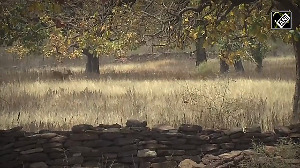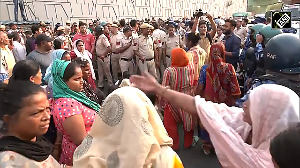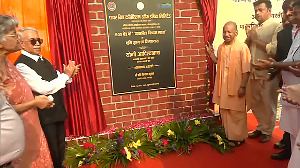Even as they asserted that Marlon Samuels was the only West Indies player who was in touch with a bookie before the team's first one-day international against India in Nagpur last month, the Nagpur Police on Thursday put a somewhat anti-climactic end to the episode that has shaken the game in the country once again by saying that no case has been made out in the instance since the person involved did not "violate any law of the land".
The revelations by Commissioner of Police (CP) Shiv Pratap Singh Yadav must have brought relief to many that there was no blot on an Indian player, but at the same time a sense of let-down prevailed as there was much ado about nothing, at least for the time being.
Yadav's briefing to the press in Nagpur late Thursday evening was essentially a repetition of what was already known: that Samuels was in touch with Mukesh Kochar, allegedly a known bookie, for two days prior to the match and had passed on information about the forthcoming tie.
The top cop only filled certain details in the jigsaw, in the process leaving a lot to conjecture.
For the record, Yadav said that except for Samuels, no other player from either the West Indies or India who came to Nagpur for the first match had violated the International Cricket Council's code of conduct, which prevented them from speaking to bookies when into a series.
Kochar called Samuels up from a mobile telephone at least thrice before the January 21 match in Nagpur, Yadav said. He and Samuels had at least three conversations -- for about 8 minutes on the night of January 19, for about a minute and a half on the morning of January 20, and for about 6 minutes around 23.45 IST the same day, he said.
Yadav reiterated that Samuels had passed on information about the possible composition of the team, the bowling line-up and the batting order.
"Samuels said he would come on to bowl as first change, and he did," the CP said. However, there was no mention of any match-fixing per se or exchange of money, he said. Besides, Kochar seemed to know that the West Indies would bowl first, he also said.
In spite of all the information, no offence was registered since no specific case had been made out as Samuels had only violated the ICC code of conduct and did not violate any law of the land, Yadav said.
In any case, there are several legal difficulties in proving `match fixing' as such.
"How do you prove it? If a player gets out at a low score or bowls badly, you cannot say he did it deliberately," he said.
In spite of his assertion, Yadav left the door just that wee bit ajar for conjecture, saying that it was NOT yet clear as to how the information passed on by Samuels to Kochar could have influenced the outcome of the match. So the most vital question:- was the Nagpur ODI fixed or not still remains unanswered.
Giving other details, Yadav said that Kochar probably used different SIM cards for making calls to the hotel where the West Indies team had been put up, and the police had established that the bookie, said to have links with the underworld, was in Faridabad at the time. Kochar is now believed to be in the United Arab Emirates, he said.
The Nagpur police had written to the ICC and the Board for Control of Cricket in India on Wednesday after closing the investigations, but hasn't given them the transcripts of the conversation between Samuels and Kochar, Yadav said.
The transcripts have been given to senior officers of the Maharashtra police, he said.
In reply to a question, Yadav said it was the duty of the police to inform the organisation concerned if any individual associated with it violated its norms or rules, as had happened in the case of Samuels.
The Kochar family has a house in Gudgaon, Yadav said, adding that the police there had been informed of the developments in Nagpur.
"According to our information, Kochar deals in property and commodity exports. However, we do not know if he has a finance company and if it has a branch in Nagpur. We do not have any concrete information about any offences pending against him," he said.
Yadav said Kochar is being watched, but did not say by whom.
Asserting that it is a routine practice to keep watch on suspected bookies, the vicinity of the playground and other sensitive spots whenever a match is played in Nagpur, Yadav said the decision to tap the phone lines at the West Indies team hotel was made after receiving certain intelligence inputs, and was done only after completing the necessary procedure.
And, lending a new twist to the episode, Yadav said that BCCI vice-president Shashank Manohar, who is also the president of the Vidarbha Cricket Association, which hosted the match, had been informed on January 30 itself about the possibility of some important information coming out in connection with the Nagpur tie.
Meanwhile, in an unrelated development, the police on Thursday arrested four persons from Gandhibagh area of the city while betting on the ODI between India and Sri Lanka. The police also seized four mobile telephones, one colour televison and two motorcycles from the person, identified as Pramod Yerpude, Punjab Shirpure, Sunil Jain and Lalit Shende.
CINS








 © 2025
© 2025